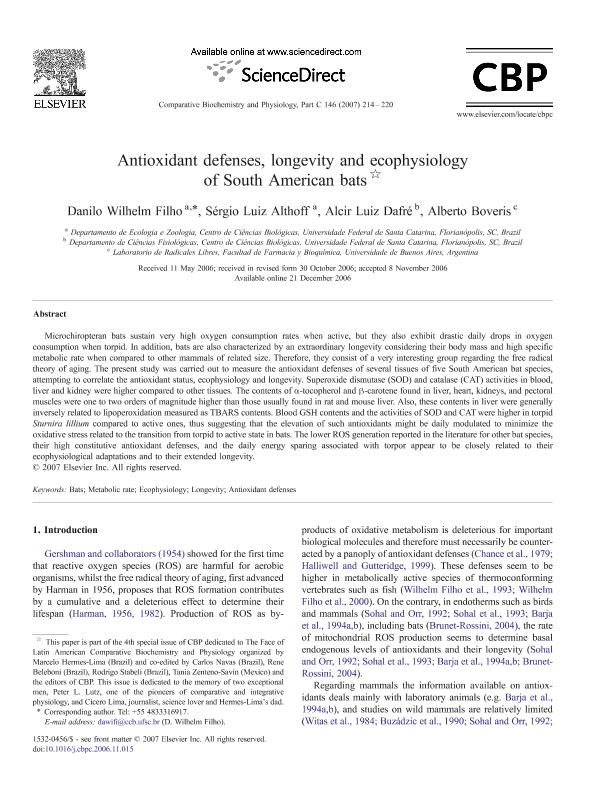Artículo
Antioxidant defenses, longevity and ecophysiology of South American bats
Fecha de publicación:
12/2007
Editorial:
Elsevier Science Inc.
Revista:
Comparative Biochemistry And Physiology. Toxicology & Pharmacology
ISSN:
1532-0456
Idioma:
Inglés
Tipo de recurso:
Artículo publicado
Clasificación temática:
Resumen
Microchiropteran bats sustain very high oxygen consumption rates when active, but they also exhibit drastic daily drops in oxygen consumption when torpid. In addition, bats are also characterized by an extraordinary longevity considering their body mass and high specific metabolic rate when compared to other mammals of related size. Therefore, they consist of a very interesting group regarding the free radical theory of aging. The present study was carried out to measure the antioxidant defenses of several tissues of five South American bat species, attempting to correlate the antioxidant status, ecophysiology and longevity. Superoxide dismutase (SOD) and catalase (CAT) activities in blood, liver and kidney were higher compared to other tissues. The contents of alpha-tocopherol and beta-carotene found in liver, heart, kidneys, and pectoral muscles were one to two orders of magnitude higher than those usually found in rat and mouse liver. Also, these contents in liver were generally inversely related to lipoperoxidation measured as TBARS contents. Blood GSH contents and the activities of SOD and CAT were higher in torpid Sturnira lillium compared to active ones, thus suggesting that the elevation of such antioxidants might be daily modulated to minimize the oxidative stress related to the transition from torpid to active state in bats. The lower ROS generation reported in the literature for other bat species, their high constitutive antioxidant defenses, and the daily energy sparing associated with torpor appear to be closely related to their ecophysiological adaptations and to their extended longevity.
Palabras clave:
ANTIOXIDANT DEFENSES
,
BATS
,
ECOPHYSIOLOGY
,
LONGEVITY
,
METABOLIC RATE
Archivos asociados
Licencia
Identificadores
Colecciones
Articulos(OCA HOUSSAY)
Articulos de OFICINA DE COORDINACION ADMINISTRATIVA HOUSSAY
Articulos de OFICINA DE COORDINACION ADMINISTRATIVA HOUSSAY
Citación
Wilhelm Filho, Danilo; Althoff, Sérgio Luiz; Dafré, Alcir Luiz; Boveris, Alberto Antonio; Antioxidant defenses, longevity and ecophysiology of South American bats; Elsevier Science Inc.; Comparative Biochemistry And Physiology. Toxicology & Pharmacology; 146; 1-2 SPEC. ISS.; 12-2007; 214-220
Compartir
Altmétricas




